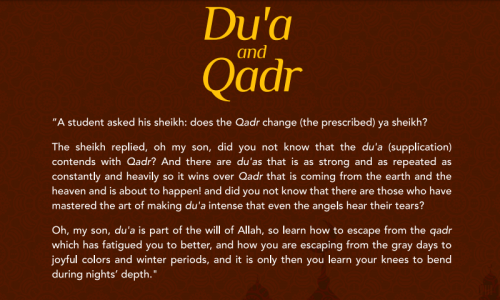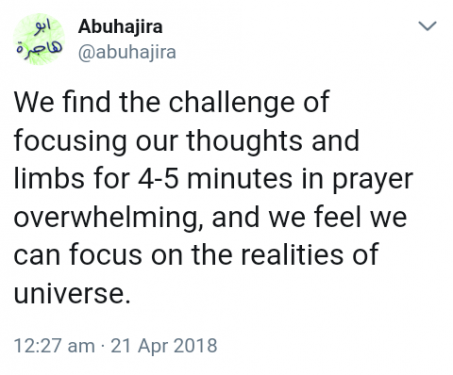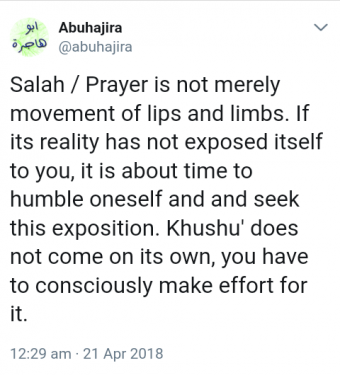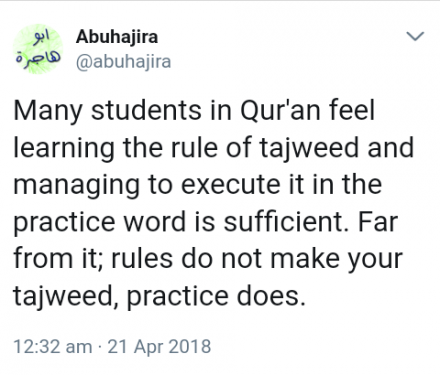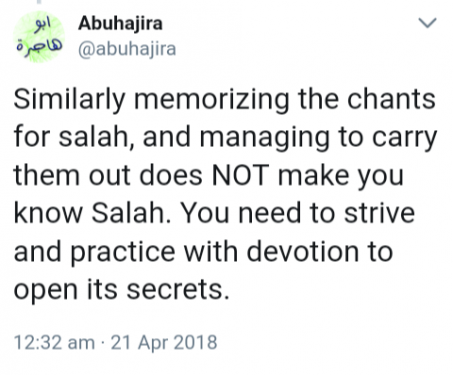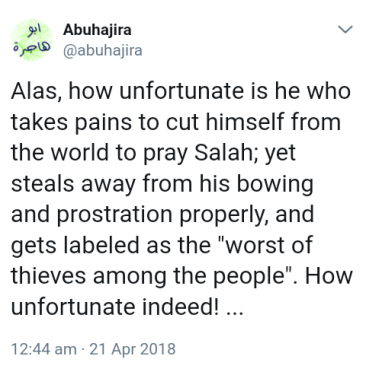-
Posts
1,759 -
Joined
-
Last visited
-
Days Won
106
Content Type
Profiles
Forums
Events
Everything posted by Bint e Aisha
-
Ask any scholar and they will tell you, living in a Shack is permissible in Islam. Why don’t we follow that fatwa; invest in a shack and live there? Because if we can afford it, we want to upgrade our lifestyle and live in luxury. Most of us are not interested in living with the bare basics. In fact, it would be considered absurd to, when you can afford more! Likewise, in Deen we should not follow the mere basic principles and do the least possible to acquire Jannah. Don’t we want luxuries in the hereafter too, where we will live forever? When our scholars give rulings of permissibility, it does not mean that we have to follow it every single time. It simply means that if we do it, there is no sin on us. It is there for us to fall back on or follow in times of need. For example, we have to do qasr on a journey. It is wajib for those following the Hanafi mazhab. However there is no sin if one leaves out the sunnah muakkadah. On the other hand if one has time then it is much more rewarding to perform the sunnah muakkadah despite the fatwa that it is permissible to leave it out. Imagine a person travels all the way from South Africa to Makkah Mukarrama and he doesn’t go to the Haram for any salaah with Jamaat not even Jumuah. When he is asked he replies that I am a musafir so Jumuah and salaah with Jamaat is not wajib for me. Now from a fatwa point of view what he is saying is correct but all of us will agree that his behavior is foolish. Why deprive oneself of so much of reward! Three quarter shorts are permissible for men but that doesn’t negate that a thawb is better and Sunnah. Wearing them does cover the satr, yes. But imagine your local Imam turned up for Salah in that attire, would we like it? Therefore, fatawa of permissibility cover the bare basics we must do. On a normal basis, we should aspire higher and go further. Do what’s Mustahab, or Sunnah of Nafl. This is what the Sahaaba RA practised and should be our normative practise too. The same applies for our children. When a family is wealthy, the parents often enrol their children into a private school. They pay expensive fees and drive far, when a local state school is around the corner. The sacrifice is made all because they want best for their children. Similar should be our efforts in bringing Islam into their lives. May Allah make us amongst those who sacrifice and strive for His pleasure, Aameen. — Hazrat Ml. Dawood Seedat حفظه الله Above is an article taken from www.islaahiadvices.com. It is an extract from Hazrat’s overnight programme on 21/04/18 in Darul Uloom Madrasatus Saadiqeen, Robertsham. To listen to the full talk, please click here.
-
10 Foods which are beneficial for Dental Health Cheese – Cheese is rich in calcium and thus helps protect teeth by re-mineralizing the enamel which is essential to avoid cavities. Thus it is recommended that one should eat cheese at the end of the meal and also purchase a brand that has high calcium content. Fish – Fish contain fluoride, which strengthens the enamel and helps fight cavities. In fact, fluoride also protects the teeth by making them more resistant to the attacks of bacteria that are present in dental plaque. It is recommended to add fish in your diet twice a week. Green vegetables – Green vegetables contain no sugar and acid thus if one wants to take care of their teeth then they should not hesitate to consume green vegetables. Citrus fruits, apple juice or tomatoes which are generally considered very healthy and rightly so may cause demineralization of the teeth. Finally, green vegetables are often rich in calcium and fluoride and vitamins that are good for the gums. Dark chocolate – This may be a surprise but dark chocolate is not exactly an enemy of one’s teeth. There are tannins in cocoa that have a positive effect on teeth; it can also help neutralize certain bacteria. Butter – Rich in calcium, butter is also beneficial for one’s teeth. Butter can help in the re-mineralization of the enamel. However, only moderate consumption is recommended because of its high lipid content. Meat – Meat is a good for oral health as it does not contain carbohydrates (sugars). It also provides amino acids, vitamins and trace elements. Eating meat also stimulates the production of saliva which plays a protective role for the teeth. Nuts – Nut are rich in calcium and fluoride which is beneficial for the teeth. Also because of the hard texture of nuts they have to be chewed which increase the production of saliva and thus neutralize acids. Cruciferous vegetables – Vegetables such as Brussels sprouts, cauliflower or broccoli are rich in vitamin C, calcium, magnesium and phosphorus. Thus they not only protect the gums but also help in mineralization of the enamel. Pulses – Pulses like split peas, chickpeas, and dried beans contain fluoride. Fluoride is beneficial for protection against cavities and for the mineralization of teeth. Carrots and Cabbage – Raw carrot and cabbage can also be beneficial for oral health for the simple reason that they promote chewing. Food items that promote chewing enable manual mechanical rubbing which helps remove dental plaque, food debris and bacteria. Also chewing promotes the creation of saliva that neutralizes the acids that have formed in the tooth enamel.
-
Ibn Masood (r.a) was asked, "How would you welcome the month of Ramadhaa?" He replied, "None of us (Sahaba) had the audacity to start the month of Ramadhaan whilst there was a grain of jealousy in his heart." (Lataaif al-Ma'arif)
- 6 replies
-
- 1
-

-
- preparation
- rajab
-
(and 1 more)
Tagged with:
-
Seeking the Shade of the Arsh - Guidance for the Youth Book by Maulana Yunus Patel RA This book is a revised edition of a compilation of advices that was prepared especially for a three day Youth Programme, hosted by Madrasatus Sawlehaat in Rajab 1431 / June 2010. Alhamdulillah, the first edition comprised of fifteen Malfuzaat, taken from the talks and lessons of Hazrat Maulana Yunus Patel Saheb (rahmatullah alayh) and was proof-read and edited by Hazrat Maulana. This second edition has been prepared with more of Hazrat Maulana's advices and includes standard prescriptions and guidelines towards giving up common weaknesses. Alhamdulillah, Hazrat Maulana (rahmatullahi alayh) had a unique way of presenting different analogies and lessons by which the message and importance of Taqwa and obedience to Allah Ta'ala and Rasulullah (sallallahu alayhi wasallam) were impressed in the heart and mind. These advices offered constant encouragement and motivation. The repetition of some advices is retained due to the diverse angles from which Hazrat Maulana would explain them. Download Book Now
-
Son on Drugs Correspondence of Hazrat Moulana Yunus Patel Saheb (rahimahullah) Letter: Assalaamu ‘alaikum wa rahmatullahi wa barakaatuh Respected Moulana I have a major problem. I have a young son who is into every kind of vice. He does drugs, smokes, drinks and steals. He does not want to work or study. We have been to many people and they say he has a bad jinn and lots of taweez have to be done on him. Please advise and please remember us in your du‘aas. Jazakallah Reply: Bismillahir Rahmaanir Raheem Sister in Islam Wa ‘alaikumus salaam wa rahmatullahi wa barakaatuh 1. Ta’weez and going to ‘aamils are not solutions to the problem. Sadly, these sins, which your son is caught up in, have become very common amongst our youth. Many other fathers and mothers are also enduring the same grief. 2. One major factor which contributes toward all of these evils, is the television. Generally, parents refuse to acknowledge the harms of television and they do not want to get rid of the television from their homes, but taking out the television will prove to be very favourable to good, positive change, for all.[1] 3. Of course, now we have the internet and social media. All of these give access to a world of freedom, entertainment and sins. So a greater degree of vigilance is required, with all our children. 4. As parents, there is also a need to monitor the company of our children, since company makes or breaks the individual. Try and spend quality time with your son. Show him love, compassion and mercy. Win him over. A parent’s du‘aa is an accepted du‘aa, so do not be negligent in making du‘aa for your son. Make lots of du‘aa after the five daily salaah. You will see the fruit of your du‘aas at some stage, insha-Allah. 5. Our seniors have recommended that we introduce kitaab reading in our homes, on a regular basis. Try to set aside 10 or 15 minutes for this, every day. This will prove to be greatly beneficial for all family members, insha-Allah. 6. Encourage him to go to the musjid; to make friends with those who frequent the musjid, attend good programmes, etc. Take him to someone who can counsel him and advise him to give up his evil actions, by explaining the consequences. Try and get a copy of or download the book, “Kicking the Habit” and let him read it as a prescription. 7. In all your efforts to guide and advise him, be careful not to adopt a harsh, hard-hitting approach, which could then be the cause of him rebelling more, or leaving home. You want to save your son; not lose your son. Build the bridge; don’t burn the bridge. 8. Making du‘aa for you and for him. May Allah Ta‘ala clean him of all vices and make him pious and righteous and a true flagbearer of Islam. Was salaamu ‘alaikum wa rahmatullahi wa barakaatuh Yunus Patel (Moulana) Note: The kitaab “Seeking the Shade of the ‘Arsh – Guidance for the Youth” was published after Hazrat Moulana Yunus Patel Saheb’s (rahimahullah) demise, and will, insha-Allah, prove a beneficial and encouraging read for the youth – especially, in these times of fitnah. [1] Do read the article, “The Influence of Television”. Tablighuddeen
-
-
Eight intentions before any action Submitted by Mohammed Desai on Mon, 19/06/2017 - 11:01 The 8 intentions that we should try to do before and during every action however small or big the action is. 1. Oh Allah only you are giving me the Taufeeq to do this Amal (action) and its outcome is only in your hands. 2. Oh Allah I am doing this Amal because it is your command and a Sunnah of Nabi Sallallahu Alayhi Wasallam. (Think of some commands of Allah and Sunnahs related to the action) 3. Think of some virtues of the action that are promised by Allah and Nabi Sallallahu Alayhi Wasallam. 4. Oh Allah You are watching me, You can hear me, You know what is in my heart and You are with me. 5. Oh Allah I am not fit to do this action. (Think of your sins at this point). Oh Allah all others who are doing this action are your slaves through the blessing of their action accept mine too. 6. Oh Allah I am doing this Amal only for Your pleasure. Grant me the ability to please You and protect me from Your anger. 7. Oh Allah accept this action of mine and make it a means for my Hidayat (guidance) and the Hidayat of humanity till Qiyamah. 8. After the action make Shukr to Allah and Tauba with remorse. Note: The value of an action will be determined by the intentions it is done with. The intention with which an action is done is more valuable than the action itself. (Hadeeth) The above are just a few from the many intentions that one can make. Moulana Ilyaas Rahmatullah Alaih
-
🌷?وہ ہرگز سعادت مند نہیں ہیں?🌷 اشتدی أزمةُ تنفرجی۔۔۔قدآذن لیلُک بالبلجِ شعر کا مفہوم ہے کہ "مصیبت چاہے کتنی بھی عروج پر پہنچ جائے وہ زائل ہو کر ہی رہے گی اور تمہاری رات کے جانے کا وقت آنے والا ہے۔" رات اپنا سامان اکٹھا کرکے روانہ ہورہی ہے اور صبح پہنچ رہی ہے۔ ان کی طرف نہ دیکھنا جنہوں نے اپنی زندگی کو لغویات و فیشن اور فضول خرچی میں لگا رکھا ہے، کیونکہ ایسے لوگوں کے حال پر دل خوش نہیں ہوتا بلکہ رنجیدہ ہوتا ہے۔ کچھ لوگ ایسے بھی ہیں جو ہر وقت اپنی خواہشات و نفسانی لذات کے لیے مال خرچ کرتے ہیں اور اپنی لذت حاصل کرنے کے لیے پوری جدوجہد کرتے ہیں اور ہر لذت کے پیچھے بھاگتے ہیں، خواہ وہ حلال ہو یا حرام۔ یہ لوگ ہرگز سعادت مند نہیں ہیں بلکہ غم و پریشانی اور تنگی میں ڈوبے رہتے ہیں کیونکہ جس کسی نے دین کے علاوہ کوئی اور راستہ اختیار کیا اور جس کسی نے گناہوں کا ارتکاب کیا تو وہ ہرگز سعادتمندی نہیں پاسکے گا۔ آپ اس بھول میں نہ رہیے کہ جنہوں نے اپنی زندگی کو لغویات و خواہشات اور عیش پرستی میں لگا رکھا ہے وہ خوش رہتے ہیں۔ ایسا ہر گز نہیں بلکہ بعض فقیر جو بوسیدہ جھونپڑیوں اور مٹی سے بنے مکانوں میں رہتے ہیں وہ کہیں زیادہ ان لوگوں سے سعادت مند ہیں جو ریشمی بستروں پر سوتے ہیں اور عالی شان محل میں رہتے ہیں۔ ہر وہ ایمان والی، عبادت گزار اورفقیہ عورت اس خاتون سے کہیں زیادہ سعادت مند ہے جو دین کے دشمنوں کی رائے کے مطابق چل رہی ہے۔ (ماخوذ از: دنیا کی سعادت مند عورت) (سعادت تو آپ کے اندر موجود ہے، بس اس کو کام میں لانے کی کوشش کرتے رہیں۔) تحریر: راشد محمود عُفِیٙ عٙنْہ (سکونِ دل)
-
BR120-S08 - Harms borne from disobedience of Allah continued...
-

Information on 15th Sha'baan - Night Of Barãt
Bint e Aisha replied to ummtaalib's topic in General Islamic Articles
Q&A: The 15th Sha'ban, ibn Taymiya and Weak Hadith | Mufti Abdur-Rahman ibn Yusuf https://youtu.be/QdPdm_L_i0w -

Using Social Media - A Responsibility
Bint e Aisha replied to ummtaalib's topic in General Islamic Articles
What is Dopamine and why is it killing our Imaan. Do you recall the days when we would actually read the Quran and other Islamic books or when we even used to make Dhikr. Maybe we still do, but you must admit it's not as much as it used to be. Do you remember reading the Signs of the Final Hour - do you remember the feeling of "what else will happen next"? Social Media Giants have created this artificial way to increase Dopamine effects in us and they openly admit that this was their idea and plan from day 1! This article is about the neurotransmitter and not the medication. Are you addicted to social media? Does your heart skip a beat when you receive a Tweet? If the answer is yes, then you can blame your brain, or rather, a particular chemical in it called dopamine. And while the world becomes even more engrossed in social media, so do individuals who display addiction tendencies to certain sites such as Facebook, Twitter, Instagram, What's App, Messenger and so on. In the brain, dopamine functions as a neurotransmitter—a chemical released by neurons (nerve cells) to send signals to other nerve cells. The brain includes several distinct dopamine pathways, one of which plays a major role in the motivational component of reward-motivated behavior.The anticipation of most types of rewards increases the level of dopamine in the brain, and many addictive drugs increase dopamine neuronal activity. Other brain dopamine pathways are involved in motor control and in controlling the release of various hormones. These pathways and cell groups form a dopamine system which is neuromodulatory. Inside the brain, dopamine plays important roles in executive functions, motor control, motivation, arousal, reinforcement, and reward, as well as lower-level functions including lactation, sexual gratification, and nausea. Dopamine is the cause of our ADDICTION to Social Media and the cause of us getting further and further away from Allah! When Dopamine Meets Social Media When someone receives an alert or notification on Facebook, this can be referred to as a "conditioned stimulus," Dr. Delgado says, "because it predicts a potential reward," like a new friend request or "like." "Dopamine is involved in responding to this conditioned stimulus because it has learned that the stimulus predicts a reward." Dopamine, therefore, could be one reason why many of us can't resist scrolling down and checking Facebook, or indeed setting up the notifications on the device so it "pings" with delight — and that's one reason for why they are addictive — and dopamine knows this. "It [dopamine] has learned the association between stimulus and reward — and in this case, it's the reinforced behavior of checking the phone or device," says Dr. Delgado. But when that alert turns out to be just an update or an advert, this is called a "prediction error," Dr. Delgado says. "Where the reward is less than expected and it devalues the experience. In this case, dopamine codes the prediction error signal and it helps adjusts expectations." Not only are we GLUED to our device, we are moving away from reality. We are creating a fake life, we are selling our information for free, we are selling out soul! A very hard hitting video that will prove to you that these GIANTS are doing this INTENTIONALLY www.youtube.com/watch?v=I0oL4MAOku8 Ask your self Why they're doing this? If I said we are being lured by the flute of Dajjal, you'd say I'm stupid. But fact is, majority of these technological advances are nurturing us to become slaves of Shaitan and ready to jump into what will appear as Paradise when Dajjal shows it to the people. Source: Muftisays- 15 replies
-

Capital Punishment in Islam
Bint e Aisha replied to ummtaalib's topic in Answers to Misconceptions about Islam
Allah Loves to Forgive >>If an individual was involved in the sin of adultery then he should make sincere repentance. Allah states in the Quran, “…Turn to Allah in repentance, all of you, about your past mistakes, so that you may attain salvation.”(Surah Nur: 31) >>Allah Most High told us in the Qur'an: قُلۡ يَـٰعِبَادِىَ ٱلَّذِينَ أَسۡرَفُواْ عَلَىٰٓ أَنفُسِهِمۡ لَا تَقۡنَطُواْ مِن رَّحۡمَةِ ٱللَّهِۚ إِنَّ ٱللَّهَ يَغۡفِرُ ٱلذُّنُوبَ جَمِيعًاۚ إِنَّهُ ۥ هُوَ ٱلۡغَفُورُ ٱلرَّحِيمُ "Say, O my servants who have wronged themselves: despair not of Allah's mercy; surely Allah forgives all sins; surely, He is Most Merciful and Compassionate."[Qur'an, 39:53] Commentators tell us that this verse is the most hope-inspiring verse in the Qur'an (arja ayatin fi kitabillah). Reading this verse should cause every believer to rejoice. >>The gate of repentance is open to His slaves, until the sun rises from the west. The Prophet (peace and blessings of Allaah be upon him) said: “Allaah spreads out His Hand at night to accept the repentance of those who did wrong during the day, and He spreads out His Hand during the day to accept the repentance of those who did wrong during the night. (This will continue) until the sun rises from the west.” (Narrated by Muslim, no. 2759) >>Said bin Jubair narrates that Ibn Abza said to me, “Ask Ibn ‘Abbas regarding the Statement of Allah: ‘And whoever murders a believer intentionally, his recompense is Hell.’ (4.69) And also His Statement: ‘…nor kill such life as Allah has forbidden, except for a just cause …..except those who repent, believe, and do good deeds.’ (25.68-70) So I asked Ibn ‘Abbas and he said, “When this (25.68-69) was revealed, the people of Mecca said, “We have invoked other gods with Allah, and we have murdered such lives which Allah has made sacred, and we have committed illegal sexual intercourse. So Allah revealed: ‘Except those who repent, believe, and do good deeds and Allah is Oft-Forgiving, Most Merciful.’ (25.70) From the above it is clear that if one does sincerely repent then Allah would accept this. However for repentance to be sincere and accepted the individual must renounce the sin itself, feel remorse and make a firm determination never to repeat it. The true repentance is characterized by signs, among which are a softness of the heart, frequent weeping, adhering to obedience, and keeping away from evil companions and places. >>The Messenger of Allah (peace and blessings be upon him) promised that,“The one who repents from sin is like one who never sinned.” [Ibn Maja] -

Keeping photos of the deceased at home
Bint e Aisha replied to Bint e Aisha's topic in Hanafi Fiqh (General)
Question Assalamu Alaikum. My father in law passed away on Saturday evening (please make dua maghfirat for him and pray Allah gives the family sabr) We have some photos of him we would like to keep. Please tell me is it permissible to keeps photos, even of we decide to not look at them but just keep them with the intention of showing his grandchildren when they get older. Would you also please inform me of what the consequence of keeping the photos would be for the marhoomeen as some members are adamant on keeping them Please advise. Wassalam. Answer Walaikumussalam w w May Allah shower His mercy upon the grave of your grandfather, forgive his mistakes and elevate his ranks in jannah, And give sabr to the whole family. Sorry for the delay in replying. I had to give careful consideration and make mashwera. Mufti Tahir Saheb of Saharnpoor is very strict and says It would be haram to keep them. Firstly, photos should not be taken unless extremely necessary. Showqia photos are not allowed, Eg holiday snaps, wedding memories etc Thereafter, if any photos are taken out of necessity, and the person dies, the correct procedure is to destroy them. Especially showqia photos and videos must be destroyed. If the necessary ones are not displayed but kept concealed, there might be some flexibility in there. Photos kept for respect will not be allowed, eg photos of buzrugs. This is because this reverence could lead to their worship. Mufti Mahmood Saheb went to someone’s house, who showed them the photo of some buzrug. Mufti Saheb tore it apart. The person felt bad. Mufti Saheb said this is also tagyeerul munkar. (rectifying the incorrect). Mufti saheb went on to say that keeping photos of awliyaullah is worse than keeping photos of others. If the marhoomeen had instructed their family to keep their photos or liked their photos to be kept or knew about them but they did not instruct their disposal, then there is a possibility of them being reckoned in the qabr. This is derived from the mas’la of maatam (lamenting), where Rasulullah sallallahu alayhi wa sallam said الميت يعذب بما نيح عليه “The mayyit gets azaab when nawha is done upon it” The commentators have mentioned various reasons for this azaab. 3 of them are what I have said above. So this could also be applied to the mas’ala of photos and other unislamic instructions left behind. Allah knows best Tafseer Raheemi -
Keeping photos of the deceased at home In the name of Allah, the most Beneficent, the most Merciful. Islam only permits a person to take photos out of necessity like for ID cards or passports. Once a person passes away there is no need to have any photos of the deceased. True memories of a Muslim relative or friend reside in the heart, and then this should be manifested by praying for the deceased. Therefore, it is advised that all photos of the deceased are burnt or removed from mobile phones. Saaidah Aisha Radiallahu Anha narrates that when the Prophet became ill, some of his wives talked about a church which they had seen in Ethiopia and it was called Mariya. Umm Salama Radiallahu Anha and Umm Habibah Radiallahu Anha had been to Ethiopia, and both of them narrated its (the Church's) beauty and the pictures it contained. The Prophet of Allah Sallallahu Alahi Wasalam raised his head and said, "Those are the people who, whenever a pious man dies amongst them, make a place of worship at his grave and then they make pictures of those people in it…" (Saih Bukhari) The main reason for its impermissibility is that it opens the door of idol worshiping. It began with people keeping these pictures with the intention of keeping alive the memory of the deceased which, finally, led to idol worshiping. (The wisdom behind the commands of Islam p.350) The conclusion we can come to is that it is not permissible to keep photos of the deceased after they have passed away either in picture form or on mobile phones. The best way to remember the deceased is by visiting his grave and by praying for him or her. Only Allah Knows Best Mohammed Tosir Miah Darul Ifta Birmingham Source
-

Capital Punishment in Islam
Bint e Aisha replied to ummtaalib's topic in Answers to Misconceptions about Islam
Capital Punishment in the Old Testament Kill those who commit adultery Leviticus 20:10 “If a man commits adultery with another man’s wife—with the wife of his neighbor—both the adulterer and the adulteress are to be put to death." Deuteronomy 22:22 “If a man is found sleeping with another man’s wife, both the man who slept with her and the woman must die. You must purge the evil from Israel." Stone both to death when they commit fornication Deuteronomy 22:23 “If a man happens to meet in a town a virgin pledged to be married and he sleeps with her, you shall take both of them to the gate of that town and stone them to death—the young woman because she was in a town and did not scream for help, and the man because he violated another man’s wife. You must purge the evil from among you." Murderer should be killed Exodus 21:12 “Whoever strikes a man so that he dies shall be put to death." Law of Retaliation Leviticus 24:17-22 “Whoever takes a human life shall surely be put to death. Whoever takes an animal's life shall make it good, life for life. If anyone injures his neighbor, as he has done it shall be done to him, fracture for fracture, eye for eye, tooth for tooth; whatever injury he has given a person shall be given to him. Whoever kills an animal shall make it good, and whoever kills a person shall be put to death." Kill the apostate Chronicles 15:13 "But that whoever would not seek the Lord, the God of Israel, should be put to death, whether young or old, man or woman." -

Capital Punishment in Islam
Bint e Aisha replied to ummtaalib's topic in Answers to Misconceptions about Islam
Capital Punishment for Murder Qisas Allaah, may He be exalted, says (interpretation of the meaning): “O you who believe! Al-Qisaas (the Law of Equality in punishment) is prescribed for you in case of murder: the free for the free, the slave for the slave, and the female for the female. But if the killer is forgiven by the brother (or the relatives) of the killed against blood money, then adhering to it with fairness and payment of the blood money to the heir should be made in fairness. This is an alleviation and a mercy from your Lord. So after this whoever transgresses the limits (i.e. kills the killer after taking the blood money), he shall have a painful torment” [al-Baqarah 2:178]. Qisas is an Arabic term which means “Legal Retaliation”, and follows the principle of an eye for an eye, a nose for a nose. A perpetrator of the crime is punished with the same injury that he caused to the victim. If the criminal killed the victim, then he is killed. If he cut off or injured a limb of the victim, then his own limb will be cut off or injured without killing the criminal. This is understood from the following verse of the Quran: "And We ordained therein (Torah) for them (the Bani Israa’eel): Life for life, eye foreye, nose for nose, ear for ear, tooth for tooth and wounds equal for equal. But if anyone remits the retaliation by way of charity, (by forgiving the attacker and waiving the Qisas) it shall be for him an expiation. And whosoever does not judge by that which Allah has revealed, such are the Zalimun (oppressors and wrongdoers.)" [al-Maa’idah 5:45] The issue of Qisas is referred to an Islamic court where the Qadhi (Muslim Judge) will analyse the situation and issue an appropriate decree. Qisaas by killing the killer can only be in cases of deliberate killing, according to scholarly consensus. Allaah says (interpretation of the meaning): “And whoever is killed wrongfully (Mazlooman intentionally with hostility and oppression and not by mistake), We have given his heir the authority [to demand Qisaas, __Law of Equality in punishment __or to forgive, or to take Diyah (blood money)]. But let him not exceed limits in the matter of taking life (i.e. he should not kill except the killer)” [al-Isra’ 17:33] “Al-Qisaas (the Law of Equality in punishment) is prescribed for you in case of murder” [al-Baqarah 2:178] “And there is (a saving of) life for you in Al-Qisaas” [al-Baqarah 2:179] What is meant – and Allaah knows best – is that the requirement of qisaas deters the one who wants to kill from doing so, out of compassion towards himself so that he will not be killed, and so that the one whom he wanted to kill will remain alive. And it was said that the killer would generate enmity between himself and the tribe of the one whom he killed, so he wants to kill them for fear of them and they want to kill him and his tribe in revenge. If he is executed as a punishment according to sharee’ah, that will prevent the reason for fighting between the two tribes. The Prophet (peace and blessings of Allaah be upon him) said: “If a person’s relative is killed, he has the choice of two options: either (the killer) may be killed or the fidyah (ransom, blood money) may be paid.” There was no difference of opinion among the scholars that it is valid for the heirs of the victim to forego qisaas and accept the diyah. This is what is indicated by the hadith quoted above. In that case, the killer may be set free and he should be obliged to pay the diyah. -
-
BR120-S07 - Practical assessment of harms borne from disobedience of Allah
-
Mālik b. Dīnār said, ❝If the dunyā consisted of temporary gold, and the Hereafter of eternal sand, then a smart person should choose the eternal sand and ignore the temporary gold!” I say: ‘Well, then how difficult can our choice really be, when we know that the dunyā consists of temporary sand and the Hereafter consists of eternal gold?’❞ (al-Qurṭubī, al-Jāmiʿ li-Aḥkām al-Qurʾān: 20/22)
-
Eating rice with hands is NOT a sunnah? Words pleasing to ears isn't a sign for its authenticity. Since few years Moulana Tariq Jameel Sahab (db) has been seen prescribing this to the students of madaaris. And then through ascription towards him everyone has started doing the same. Infact the reality is that having meal with hands is masnoon. While eating rice in itself is not masnoon. Adding both and proving that eating rice with hands isn't sunnah is just a false analogy. If having meal with hands is masnoon. Then even if rice is to be eaten, using hands for it would also be considered masnoon. As for the matter that having rice this way alienates people then this problem exists in all foods. Its not specific with just rice. Having chapati dipped in gravy in such a way that its drops spread over hands and clothes or any such style of eating which turns away people should then also be considered against sunnah. But the reality is that when Prophet ﷺ would have pumpkin he would search the entire can using his fingers for the remains of it. Thus sunnah must be that we also adopt this way while eating pumpkin. Moreover, very rarely would he have meat to eat but when he would, then he would tear its pieces using his canines/teeth. Hence sunnah must also be accordingly. Now even if this act would alienate sophisticated people, then what would be its solution? Finally, who says to add so much gravy onto the rice that it looks odd.If eaten properly then even rice can be had with hands in a very sophisticated manner. But, eating with hands only should also not be insisted upon. Rather if someone eats with spoon then that's also fine, but if he uses his hands in a wise manner then this act must also be appreciated as being the love for the Prophet ﷺ. Mufti Abuhajira DB
-
Dear Sister, Don't allow the thought that 'Men don't wear a ḥijāb and hence they are somehow superior to women in Islam' or that 'Islam is somehow a misogynistic religion because it forces ḥijāb on to women alone' to ever cross your mind. It should be sufficient for you to know that Allah Himself has taken a ḥijāb. A ḥijāb unlike any other ḥijāb A ḥijāb that veils the creation of Allah from being overwhelmed by the Beauty, the Glory, the Perfection, and the Majesty of Allah. A ḥijāb about which the Messenger ﷺ said, ❝ His ḥijāb is light! If Allah was to unveil this ḥijāb, the Divine Glory of Allah would burn everything of his creation [as the creation wouldn't be able to handle His Beauty, Perfection, Majesty, and Glory]. ❞ [Ibn Mājah] Your ḥijāb is not a sign of your inferiority to men. It's a sign of your beauty, fulfillment, and special bond with Allah. ~Ustadh Abdul Wahab Salim
-
BR150-S06 - The consequences of disobedience befall in this world

